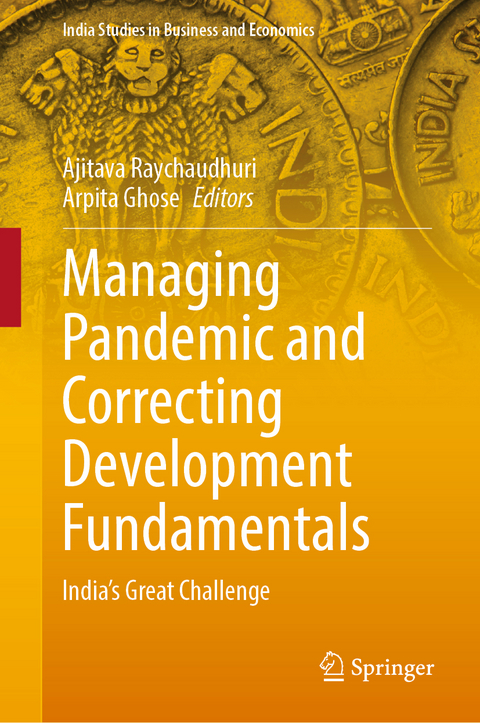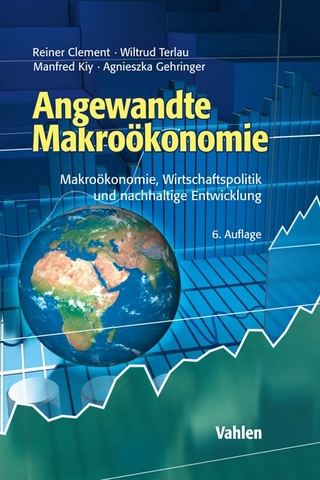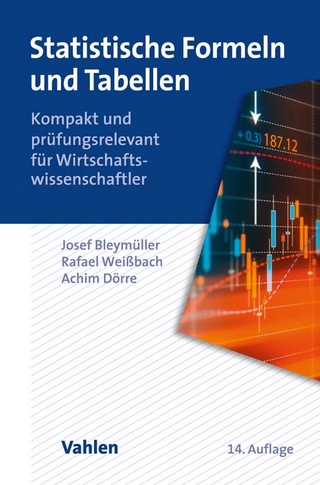
Managing Pandemic and Correcting Development Fundamentals
Springer Verlag, Singapore
978-981-19-8679-6 (ISBN)
This book discusses the extent and nature of COVID-19 pandemic in India and its effect on the society and economy. The suggested management practices discussed here are also not stereotype. At the same time, it highlights deficiency in development fundamentals in India on several dimensions, especially health, education, quality of public spending, taxation orientation, external trade involvement across states, etc., deficiencies which create an inbuilt bottleneck toward the creation of a more equal society. While discussing these, the book throws light on how they were expectedly exacerbated by the sudden negative shock in the form of COVID-19 pandemic. Thus, the book has highlighted the COVID pandemic and its response in India in the background of certain less discussed aspects of development fundamentals.
The contents would be of interest to researchers and students studying socioeconomic aspect of developmental economics and also to policy makers and non-government entities involved in mitigating effects of pandemic in the socioeconomic sphere.
Ajitava Raychaudhuri is currently Professor Emeritus and Head, Economics Department, Adamas Univeristy. Earlier, he retired as Professor and former Head and Coordinator of Centre for Advanced Studies, Department of Economics as well as former Dean, Faculty of Arts of Jadavpur University, Kolkata, India. A Ph.D. from American University, USA, he was Senior Fulbright Scholar at Economic Growth Center, Yale University, USA, and Reid Hall Scholar in Residence of Columbia University, Paris Campus, France. He has undertaken several important projects from UNESCAP, ADB, World Bank, UNDP, PEP, etc. He has also written and edited several books and contributed numerous papers in international and national journals as well as in edited books. Arpita Ghose is a Professor, Department of Economics, Chair-Professor (honorary), Panning and Development Unit (PDU), NITI Aayog, Government of India (GOI), Jadavpur University (JU), Kolkata, India, former Dean, Faculty of Arts and Head, Department of Economics, JU. A Ph.D. from Indian Statistical Institute, Kolkata, she worked on disequilibrium economics; has written and edited books; contributed numerous papers in international and national journals, edited books from reputed publisher on computable-general-equilibrium-models/ productivity/ efficiency analysis using data-envelopment-approach and stochastic-frontier-models/ applied time-series econometrics. She has presented various invited lectures/ research papers and chaired sessions at different international conferences/symposium, completed several important major projects funded by DFID-UNCTAD-GOI—JU—Trade Research Capacity-Building-Program/Shastri—Indo-Canadian Institute, Calgary, Canada/Department of Health and Family-Welfare, Government of West-Bengal,/UGC-UPE(University-as-Potential-for Excellence), JU/ICSSR/PDU, JU among others and is the joint PI of a collaborative research project of PDU,JU with NITI Aayog. She has supervised Ph.D. students;her major research interests are Econometrics/Macroeconomics/empirical models including International Trade / economics of social-sector and regional-development.
The complexity of Managing COVID-19: How Important is Good Governance?.- Covidonomics or the Curious Case of a Supply Constrained Keynesian Equilibrium.- Contact Intensity, Unemployment and Finite Change -The Case of Entertainment Sector under Pandemic.- Financing Economic Recovery: The Covid Challenge.- Transformation in Higher Education in the Post-Covid Era: A Perspective from Economics.- Pandemic-induced Poverty in India after the First Wave of COVID-19: An Elaboration of Two Earlier Estimates.- Trends, Patterns and Regional Variations of Covid-19 Pandemic in India at Sub-National Level: Analysis based on Spatial Econometric Method.- Unequal Inequalities in India: Income and Non-Income Dimensions.- Exploring the Significance of Food Insecurity Mediated Poverty and Low Productivity Traps: Furthering Policy by Reconciling Secondary Data with Primary Surveys.- State-level Exports: An Alternate Exploration using ASI Unit Level Data.- Subaltern Culture and Happiness in Tribal Communities of West Bengal.- Is GST Reform Pro-Poor In India?.- Public Expenditure Quality of States for Education and Health, Does Rationalisation of Grants Matter?.-Measurement and Determinants of Efficiency of Government and Government Aided Secondary School in Kolkata: An Application of Data Envelopment Approach.
| Erscheinungsdatum | 06.06.2023 |
|---|---|
| Reihe/Serie | India Studies in Business and Economics |
| Zusatzinfo | 124 Illustrations, color; 13 Illustrations, black and white; XV, 316 p. 137 illus., 124 illus. in color. |
| Verlagsort | Singapore |
| Sprache | englisch |
| Maße | 155 x 235 mm |
| Themenwelt | Wirtschaft ► Volkswirtschaftslehre ► Makroökonomie |
| Wirtschaft ► Volkswirtschaftslehre ► Wirtschaftspolitik | |
| ISBN-10 | 981-19-8679-7 / 9811986797 |
| ISBN-13 | 978-981-19-8679-6 / 9789811986796 |
| Zustand | Neuware |
| Informationen gemäß Produktsicherheitsverordnung (GPSR) | |
| Haben Sie eine Frage zum Produkt? |
aus dem Bereich


